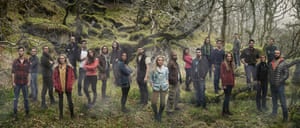Eden: Paradise Lost - Channel 4
'Eden: Paradise Lost' was first broadcast as 'Eden' on Channel 4 in 2016. The programme followed the experience of a group of men and women from the UK as they "face the challenge of building a new life and creating a new society from scratch" (Channel4.com, 2015). Using an "embedded crew" (Channel4.com, 2015) the group have only the basics to survive and build a new society but after the only a few episodes being aired in 2016 it was "pulled from screens" (Swindon, 2017) and in 2017 it was rebranded as 'Eden: Paradise Lost' to "tell the story of how it all fell apart so dramatically" (Nicholson, 2017).
When the participants emerged from Eden, they realised that it "had not been on television in months" (Nicholson, 2017) mainly due to the ratings falling "from 1.7 million to 800,000 over four episodes" (Swindon, 2017).
So why did this programme fail? The five new episodes that were broadcast in August 2017 show exactly how it fell apart. After watching one episode I can conclude that it spiraled into chaos due to the sexism, bullying and even fistfights between some of the participants made Eden "quite dark" (Swindon, 2017). The Guardian describes it as being full of "bullying, cliques, fistfights and even outright revolt" (Tate, 2017).Another reason why it failed was that "the production was costly" (Swindon, 2017) and so it was removed silently from our screens.

The Channel 4 remit includes "[taking] bold creative risks" (Channel4.com, n.d.) and this is exactly what they thought they were doing when 'Eden' was commissioned. 'Eden' gives the target audience, 18-30 year olds, a programme packed with drama, strong language and confrontation, making it appeal to the audience through diversion from their normal lives to see if people can become self-sufficient with the bare necessities.
'Big Brother' on Channel 5 is similar to 'Eden: Paradise Lost' in many ways, such as the diary room aspect with the self-interviews the participants filmed in Eden and the controversial topics and fights they all got into is similar to Big Brother. Also, Big Brother is filmed through secret cameras and Eden has a few of them dotted around the secluded location but it is mainly filmed by the "embedded crew" (Channel4.com, 2015) unlike 'Big Brother'. Another aspect of Eden's format that is similar to Big Brother's is that people can leave when they want and in Big Brother, this is the case but the main focus of that programme is the eviction process which isn't featured in Eden.
Overall, 'Eden: Paradise Lost' gives a conclusion to the failed series that was 'Eden' and explains to those viewers who did watch it exactly how and why it was canceled.
When the participants emerged from Eden, they realised that it "had not been on television in months" (Nicholson, 2017) mainly due to the ratings falling "from 1.7 million to 800,000 over four episodes" (Swindon, 2017).
So why did this programme fail? The five new episodes that were broadcast in August 2017 show exactly how it fell apart. After watching one episode I can conclude that it spiraled into chaos due to the sexism, bullying and even fistfights between some of the participants made Eden "quite dark" (Swindon, 2017). The Guardian describes it as being full of "bullying, cliques, fistfights and even outright revolt" (Tate, 2017).Another reason why it failed was that "the production was costly" (Swindon, 2017) and so it was removed silently from our screens.

The Channel 4 remit includes "[taking] bold creative risks" (Channel4.com, n.d.) and this is exactly what they thought they were doing when 'Eden' was commissioned. 'Eden' gives the target audience, 18-30 year olds, a programme packed with drama, strong language and confrontation, making it appeal to the audience through diversion from their normal lives to see if people can become self-sufficient with the bare necessities.
'Big Brother' on Channel 5 is similar to 'Eden: Paradise Lost' in many ways, such as the diary room aspect with the self-interviews the participants filmed in Eden and the controversial topics and fights they all got into is similar to Big Brother. Also, Big Brother is filmed through secret cameras and Eden has a few of them dotted around the secluded location but it is mainly filmed by the "embedded crew" (Channel4.com, 2015) unlike 'Big Brother'. Another aspect of Eden's format that is similar to Big Brother's is that people can leave when they want and in Big Brother, this is the case but the main focus of that programme is the eviction process which isn't featured in Eden.
Overall, 'Eden: Paradise Lost' gives a conclusion to the failed series that was 'Eden' and explains to those viewers who did watch it exactly how and why it was canceled.
References
Eden: Paradise Lost, 02:55 10/08/2017, Channel 4, 55 mins. Retrieved 14 October, 2017, from, https://learningonscreen.ac.uk/ondemand/index.php/prog/0F6D1310
Channel4.com. (2015). Channel 4 seeks Eden - Channel 4 - Info - Press. Retrieved 14 October, 2017, from, http://www.channel4.com/info/press/news/channel-4-seeks-eden
Channel4.com. (2015). Channel 4 seeks Eden - Channel 4 - Info - Press. Retrieved 14 October, 2017, from, http://www.channel4.com/info/press/news/channel-4-seeks-eden
Swindon, P. (2017). Paradise lost: how reality TV show Eden was cast into darkness.Retrieved 14 October, 2017, from, http://www.heraldscotland.com/news/15456341.Paradise_lost__how_reality_TV_show_Eden_was_cast_into_darkness/
Nicholson, R. (2017). Eden: Paradise Lost review – not quite a Lord-of-the-Flies descent into carnage. Retrieved 14 October, 2017, from, https://www.theguardian.com/tv-and-radio/2017/aug/08/eden-paradise-lost-review-not-lord-of-the-flies-carnage
Tate, G. (2017). Bullying, cliques and fistfights: secrets from Eden, the reality show that nobody watched.Retrieved 14 October, 2017, from, https://www.theguardian.com/tv-and-radio/2017/aug/04/eden-paradise-lost-reality-show-nobody-watched
Channel4.com. (n.d.). Channel 4's remit | C4 Corporate.Retrieved 14 October, 2017, from, https://www.channel4.com/corporate/about-4/what-we-do/channel-4s-remit